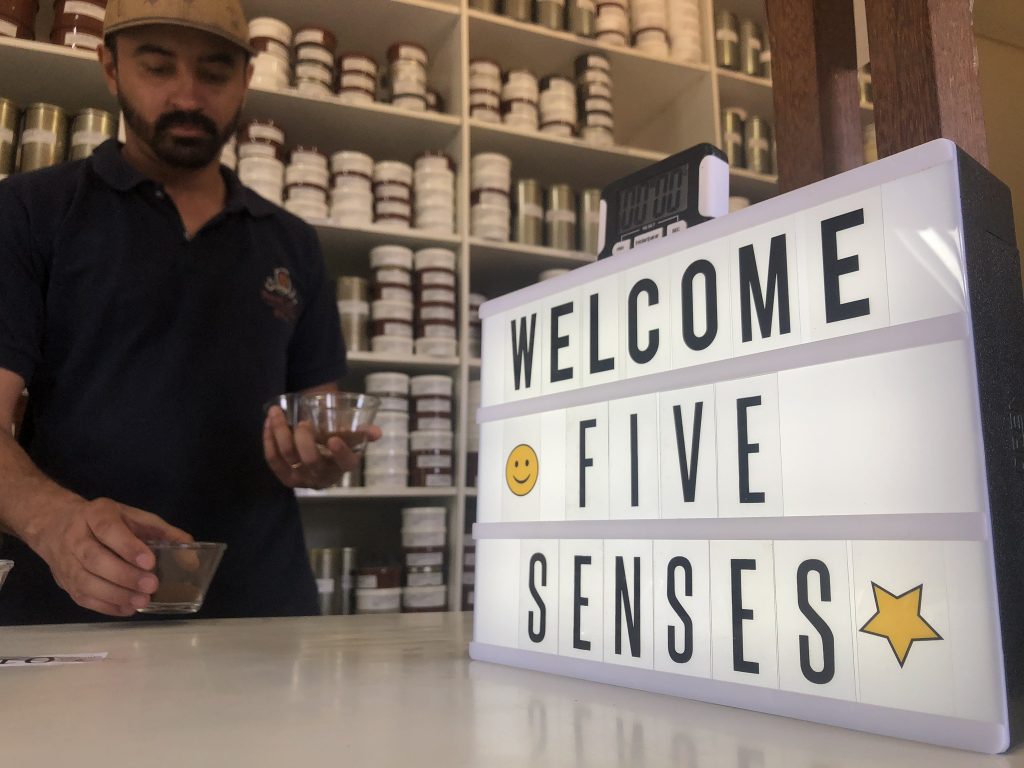When the Director of Coffee, who heads up all Five Senses origin trips, calls you on a Friday afternoon while you’re driving down the West Coast Highway and asks:
“I’m calling to ask if you’d be inter..”
“Yes.” Is the only answer.
I didn’t know what exactly I was signing up for, but the opportunity and my sense of adventure didn’t leave me much option. Brazil was the destination, and I was buzzing with excitement. We’d already sourced most of the coffee we’d need this season, so the trip was more focused on strengthening our eight-year strong relationship and searching new regions for potential micro-lots.

Brazilian Hospitality – about to get our slurp on! This cupping was in search of some micro-lots to slot into our Limited Release program.
The core of our trip was spent in Santo Antônio do Amparo, Minas Gerais where we’ve been buying coffee for just over 8 years now through the same co-operative – SanCoffee. Our relationship with SanCoffee is strong, open and consistent; we actually hosted the current SanCoffee President and grower member (Henrique Cambria) at our MICE stand in 2019 where he presented three experimental processing lots from his Samambaia farm as part of an interactive sensory experience. Henrique’s sense of pride in the coffees was apparent to anyone who sat down to experience the filter flight… he would be the first to rush over, phone in hand, to show photos of the process, and to explain in specific detail how and why they were doing what they were doing.

Not yet a member, but Fagundaz Co-op are considering it – SanCoffee runs a “Beyond Borders” program to allow farmers and other co-ops that are not members of SanCoffee to use SanCoffee facilities and reach, including but not limited to sorting, grading, storing, transportation and market access.
With 20 grower members that make up the SanCoffee co-op, the potential for learning and collaboration is huge and the positive results are tangible in the cup. Working together the producers can mitigate risk while learning from one another’s trials and successes. Undoubtedly one of the most successful members of the co-op is Fazenda Guariroba; the farm is 200 hectares in size, and farms 80 hectares of coffee. They’ve’ accrued quite the list of awards, including winning the 2016 Cup of Excellence Natural – with the top score of 90.5.

400,000 seedlings, just a few weeks away from being planted. They wait until the seedlings have 4x pairs of leaves, and then they have 40 days to plant – meaning they need to get 10,000 seedlings in the ground per day!
The way they do things here is just a little different. Not only are they blessed with some of the best natural terroir, they also drip irrigate their plantation – something very uncommon in the region. This not only creates a higher quality, but their yield is higher too. The region's average is 25x bags per hectare, and here at Guariroba, they push close to 65x bags! They have clear sustainability goals too, with a clean energy project in conjunction with UFLA (The Federal University of Lavras) which means the farm can produce all the power required to run their irrigation.

Anaerobic tanks – Coffee is placed inside these stainless steel tanks, and the oxygen in the tank is replaced with Carbon Dioxide to allow for a slower fermentation and to create a different type of fermentation using Lactobacillus.
This innovation and progressive approach to coffee growing also extends to the management of Fazenda Guariroba; Peterson Rocha is their farm manager and at just 24 years of age he might be one of the youngest farm managers around – but don’t be fooled by his age – he’s been working the farms of Santo Antonio Do Amparo for over a decade and completed extensive studies becoming a Technical Graduate of one of the local renowned Federal institutions. With his youth comes a philosophy of using progressive processing methods to push the boundaries of what we have come to expect from Brazil as a producing country, and specifically from Minas Gerais as a region. Each year is another opportunity to invest, develop, adjust and refine. The future only gets brighter – during our visit we were shown the area where they will plant Gesha for the first time, as well as four 1500 litre fermentation tanks where they’ll undertake a process known as carbonic maceration. This is a processing method where oxygen in the tanks is replaced by carbon dioxide producing a taste profile vastly different from the traditional natural and pulped natural coffees from the region. They’re not stopping!

Five Senses Coffee and their partners, Upstream and SanCoffee. Left to Right: Chris Jackson, Matt Slater, Matt Smithies (FSC), Fabrício Andrade (SanCoffee), Nythia Somaiah (Upstream), Ana Claudia Silva.
Earlier this year we were fortunate enough to bid and win a lot from Fazenda Guariroba in the 2018 Brazil Cup of Excellence Pulped Natural competition with a COE Score of 89.53 – this coffee is a cracker! We’re so proud to have partners at origin who are placing in the Cup of Excellence competition which is in place solely to celebrate, encourage and reward quality, and we’re incredibly happy to be able to show our support and thanks for their tireless work into improving quality by roasting and offering this coffee to the coffee drinkers of Australia!



